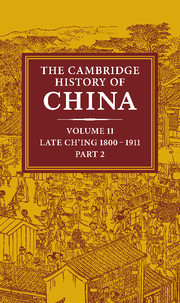Book contents
- Frontmatter
- 1 Economic trends in the late Ch'ing empire, 1870–1911
- 2 Late Ch'ing foreign relations, 1866–1905
- 3 Changing Chinese views of Western relations, 1840–95
- 4 The military challenge: the north-west and the coast
- 5 Intellectual change and the reform movement, 1890–8
- 6 Japan and the chinese revolution of 1911
- 7 Political and institutional reform 1901–11
- 8 Government, merchants and industry to 1911
- 9 The republican revolutionary movement
- 10 Currents of social change
- Bibliographical essays
- Bibliography
- Index
- Map 1. Ch’ing empire – physical features
- References
10 - Currents of social change
Published online by Cambridge University Press: 28 March 2008
- Frontmatter
- 1 Economic trends in the late Ch'ing empire, 1870–1911
- 2 Late Ch'ing foreign relations, 1866–1905
- 3 Changing Chinese views of Western relations, 1840–95
- 4 The military challenge: the north-west and the coast
- 5 Intellectual change and the reform movement, 1890–8
- 6 Japan and the chinese revolution of 1911
- 7 Political and institutional reform 1901–11
- 8 Government, merchants and industry to 1911
- 9 The republican revolutionary movement
- 10 Currents of social change
- Bibliographical essays
- Bibliography
- Index
- Map 1. Ch’ing empire – physical features
- References
Summary
The forty years intervening between the quelling of the popular uprisings and the fall of the Ch'ing dynasty were not a period of total upheaval of the Chinese social order but rather of transformation within Chinese society. Novels written at the turn of the century by Liu E and Wu Wo-yao portray scholars and officials surrounded by new types of people whose growing influence had begun to hem them in: revolutionaries from the south, Boxers from the north, and powerful businessmen with foreign connections. Certain members of the upper class clearly perceived that a social evolution was taking place and identified the decade between 1894 and 1904 as a turning point during which change accelerated in irreversible fashion. ‘In the last ten years things have changed more than in a whole century’, commented Chang Chien near the end of 1904.
Contemporary observers also noted that the most striking transformations in Chinese society during the Kuang-hsu and Hsuan-t'ung eras were occurring within the ruling classes, which were diversifying and becoming fragmented. Changes affecting the lower classes were much less evident. In contemporary accounts, the common people seemed to be still indifferent to change and only slightly worse off. In the streets of Shanghai in 1911 there was little difference in appearance between a modern factory worker and a labourer newly arrived from northern Kiangsu; there was a striking contrast, however, between the blue robes of scholars and the Western suits of businessmen, with their top-hats and motor-cars. To the passer-by this difference reflected the breadth of China's transition from the old to the new.
- Type
- Chapter
- Information
- The Cambridge History of China , pp. 535 - 602Publisher: Cambridge University PressPrint publication year: 1980
References
- 1
- Cited by



